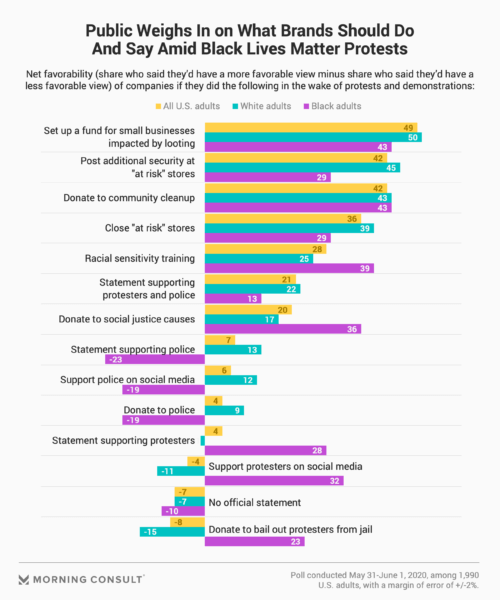When silence is not an option: Brands dive in with protest support
74% of consumers agree with the protests, but there’s divisiveness about how brands should respond to issues.
George Floyd was killed by police on May 25. Since that time, Black Lives Matter (BLM) protests have swept much of the country and grown into an international movement against racism and police violence.
Most brands have historically avoided taking political stands for fear of offending some of their customers. While that has slowly changed over time — as Millennials increasingly expect them to take stands on social and political issues — the conventional wisdom has largely remained: stay out of it.
Brands shunned Kaepernick. That was true of former NFL player Colin Kaepernick’s peaceful “take a knee” protests against police brutality roughly four years ago. He was shunned by the NFL and most brands (save Nike). Yet now, numerous high-profile companies such as McDonald’s, Target, Netflix, Google, Apple, Microsoft, Amazon, TikTok, Facebook and scores of others have raced to embrace BLM and the protests, some of which resulted in looting and violent clashes with police. That’s a radical departure from years and political issues past.
While some brands have remained silent, that’s an exception among the highest profile B2C brands. Some are speaking out because it’s the “right thing to do,” some have done it in a calculated way and others feel compelled to because their peers and competitors are doing so. Many in BLM and beyond have demanded that corporate words be followed by action: monetary contributions and hiring, board or executive changes.
Nearly three-fourths support the protests. A new Washington Post-Schar School poll (n=1,006 adults) found that 74% of Americans support the protests, although there are competing views of whether they’re largely peaceful or violent. Beyond this general support, there are more complicated views on whether brands should be speaking out and about which issues.
In a CivicScience survey conducted last week (not specifically about BLM), only 20% said it was “very appropriate” for companies to “publicly engage with social issues,” including criminal justice, gun control and gender equality. Other respondents gave more qualified answers: “it depends on the issue” (36%). Others said it was “somewhat appropriate” (16%), while the remaining 28% said it was “not at all appropriate.”

Sentiment divided by race. A May 31 – June 1 Morning Consult survey (n=1,990 adults) presented an even more complex picture of consumer sentiment about what issues and actions brands should be embracing in the context of the protests. And there are significant differences by race in some cases.
There’s broad agreement that it’s OK for brands to support small businesses impacted by looting or to donate to community cleanup. Supporting protesters on social media or donating money to bail out the arrested are much more contentious issues.
Blacks are more likely to welcome donations to social justice causes or be supportive of racial sensitivity training compared to whites. But all generally agree that saying nothing is a bad idea.
Consumers skeptical of brand sincerity. One of the other challenges for brands, as a January Morning Consult survey showed, is convincing audiences that their positions are authentic or sincere. A plurality of consumers (42%) said companies “try too hard to make it seem like they care about things besides their own bottom line.” Another 22% said they “didn’t know” and 36% were supportive of brand activism.
The way around this cynicism is actual sincerity and moral clarity, rather than second guessing and calculation. Regardless, there’s no way to be neutral on racial injustice, and silence in this case is not an option, at least for most B2C companies.
Why we care. While pressure on brands to take political positions has been growing for some time, this seems like a turning point or watershed moment of sorts. Whatever their precise motives, brands that went all-in on BLM and the protests will be expected to equally stand up for other issues going forward. Enter a new and much more complex era of brand marketing.
This story first appeared on Search Engine Land. For more on search marketing and SEO, click here.
When silence is not an option: Brands dive in with protest support
Marketing Land – Internet Marketing News, Strategies & Tips
(18)


